#norma jeane baker of troy
Explore tagged Tumblr posts
Text


6 notes
·
View notes
Text

“norma jeane baker of troy” - anne carson
#quotes#anne carson#helen of troy#marilyn monroe#norma jean baker#norma jeane baker of troy#greek mythology#trojan war#poetry
3 notes
·
View notes
Quote
Desire is about vanishing. You dream of a bowl of cherries and next day receive a letter written in red juice.
Anne Carson, Norma Jeane Baker of Troy
13 notes
·
View notes
Text
“A cloud? he’ll say. We went to Troy to get a cloud? We lived all those years knee-deep in death for the sake of a cloud?”
Norma Jeane Baker of Troy is my second attempt at Anne Carson, the first being The Autobiography of Red, which I had read years ago at a younger age. At the time, contextually, much of the callbacks and themes went over my head. It’s nice to better be involved with what topics are being deconstructed in a short vignette like this after all. Carson’s prose is always melancholy and beautiful and sharp and she uses Greek mythology and pop culture history as a venue for fascinating remarks on forced-feminine veneers.
There is an alternative mythology documented by a few Ancient Greek authors where Helen of Troy was not in Troy during the entirety of the Trojan war, but in fact in Egypt, and in her place was a cloud in her exact form called an eidolon. Carson floats this line of myth with the idea of Marilyn Monroe, the Hollywood starlet, as Norma Jeane Baker’s own “cloud.” A decoy, but not a deceit of any kind. “Substitute the playful and musical Russian expression maskirovka: masking.” This is what Carson is exploring in this piece, the idea of masks and clouds as protection, particularly as marks of surviving womanhood.
If you pick a flower, if you snatch a hand-bag, if you possess a woman, if you plunder a storehouse, ravage a countryside or occupy a city, you are a taker. You are taking. In ancient Greek you use the verb ápπáζειν, which comes over into Latin as rapio, rapere, raptus sum and gives us English rapture and rape—words stained with the very early blood of girls, with the very late blood of cities, with the hysteria of the end of the world. Sometimes I think language should cover its own eyes when it speaks.
#r#anne carson#norma jeane baker of troy#helen of troy#are we just crossposting reviews now? whatever
0 notes
Text

Anne Carson, from "Norma Jean Baker of Troy," originally published in 2019
661 notes
·
View notes
Text




Ben Whishaw on heels for Norma Jean Baker of Troy
67 notes
·
View notes
Text
somehow I was compartmentalizing the fact that the greek shipping magnate maria callas had an affair with was in fact aristotle onassis of jackie kennedy onassis. how are there not 3-5 stage plays or possibly operas by gay men about these two women being in the same room
26 notes
·
View notes
Text
...Euripides makes a hero out of Helen, who was brutalized by merely staring at war too long.
―Anne Carson, Norma Jean Baker of Troy
37 notes
·
View notes
Text

















"ok. daryl watts. she is basically helen of troy of womens ice hockey"
Norma Jean Baker of Troy by Anne Carson / x / x / Sceptres forward Daryl Watts brings skill and attitude. She hates losing more than she loves winning / x / x / The Gods Show Up / Antigone by Sophocles trans. Paul Woodruff / If Not, Winter: Fragments of Sappho trans. Anne Carson
#og#pwhl#toronto sceptres#daryl watts#pwhl sceptres#hockey#webweave#anne carson#image descriptions to come i have spent 2 hours on this and i just need to post it#shout out griffin for the educational presentation and title
83 notes
·
View notes
Text

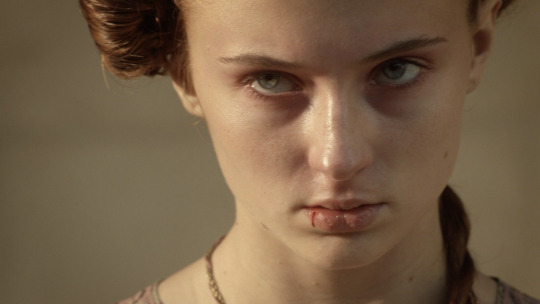


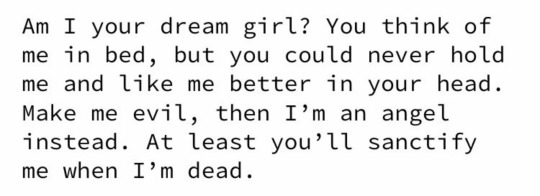


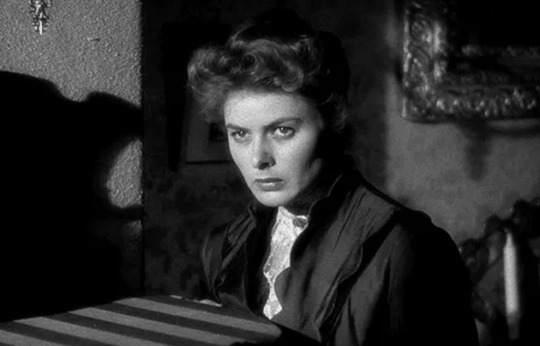

Feminine Rage
‘As women raged, old men fumbled and cried: “we’re sorry, we thought you didn’t care, oh.” - Florence + the Machine, 100 Years
Florence Welch // Sansa Stark, Game of Thrones // Anne Carson, Norma Jean Baker of Troy // Lucrezia Borgia, The Borgias // Florence + the Machine, Dream Girl Evil // Alicent Hightower, House of the Dragon // Kiki Rockwell, Same Old Energy // Paula Alquist, Gaslight // Taylor Swift, Mad Woman
#just thinking about them#my first attempt at web weaving#feminine rage#mad women#Florence Welch#dream girl evil#Sansa stark#alicent hightower#game of thrones#house of the dragon#lucrezia borgia#the Borgias#gaslight 1944#Ingrid Bergman#anne carson#kiki rockwell#Taylor Swift#web weaving#mine#girlhood#womanhood
1K notes
·
View notes
Text
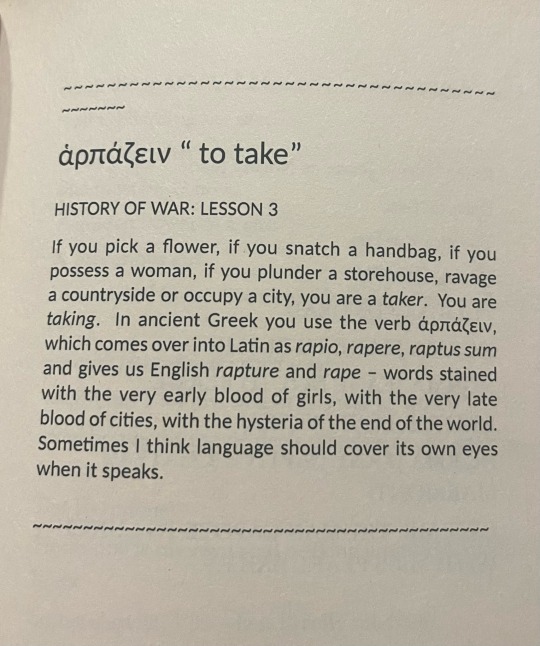
Norma Jean Baker of Troy, Anne Carson
#Anne Carson#Helen#Trojan war#euripides#Iliad#odyssey#ofc this is only related to the other two but yk a shared audience#rape mention
191 notes
·
View notes
Text
feb + mar + apr reads
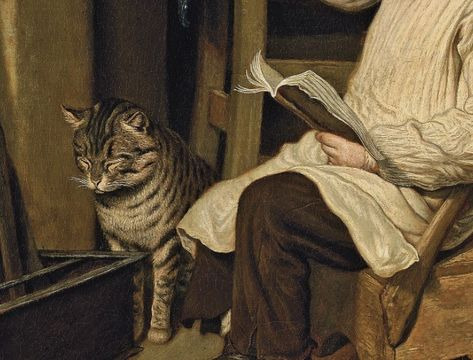

norma jean baker of troy by anne carson [★★★★★]
"Sometimes I think language should cover its own eyes when it speaks."
"Is she human? Are you? Is she a beast out of control? There's so much danger. No human can become just a beast, you plunge beyond - beyond what? Remember Jack the Ripper? 'I'm down on whores and I shan't quit ripping them till I get buckled,' Jack wrote in a letter to the newspaper, September 18, 1888. He never did get buckled. Of course insane, his mind blooming with it, who could go down that rabbit-hole or unlock such a puzzle as Jack? - but still, the woman! the thing is! the woman has everything and you smile and you take some."
: ̗̀➛ an exploration of the lives and myths of marilyn monroe and helen of troy.
: ̗̀➛ anne carson is there anything you can't do? please email me back. please.

piglet by lottie hazell [★★★★]
"'I want to make some food,' she said. 'For both of us?' he asked. 'No, just for me.'"
: ̗̀➛ one woman, piglet, and the lead up to her wedding in the face of a big confession from her fiancé.
: ̗̀➛ this one slipped beneath my skin and writhed around the spot inside me where i've tucked away all of my food issues.

merciless gods by christos tsiolkas [★★]
"I'm scared that if I let go, not only the room, not only this city, but the whole world will go cold forever."
"Your false gods cannot save you. There is only one God, my God."
: ̗̀➛ short stories that bash you over the head with how awful things and people and places can be. i did not live for this one... particularly wasn't into the one where a guy jerked his dad who has alzheimers off.

foe by iain reid [★★]
"All day. Time keeps moving. I've always thought that was a good thing. Until recently. I'm not so sure now. Is it good? For time to go by fast?"
: ̗̀➛ they want to send junior to space and replace him with a robot that looks and acts and talks exactly like him so his wife has company in his absence.
: ̗̀➛ marriage and trust and complacency, and a guy called terrence who we get reminded over and over has long gorgeous hair.
: ̗̀➛ a little boring for my taste. i had an idea of where it was going pretty early on, and it took a while for me to be proven right. pretty disconcerting!

acts of desperation by megan nolan [★★★★]
"The need was a true and human part of me, but I could feel nothing else of myself to be true or human, and so the need seemed ungodly, an aberration."
: ̗̀➛ a book full of confession, desire, jealousy, violence, and power. messy messy messy!!!! readers procceed with caution.
: ̗̀➛ shout out to everyone who said i should read this - you were right, it is up my alley.

gone girl by gillian flynn [★★★★]
"My wife was no longer my wife but a razor-wire knot daring me to unloop her, and I was not up to the job with my thick, numb, nervous fingers. Country fingers. Flyover fingers untrained in the intricate, dangerous work of solving Amy. When I'd hold up the bloody stumps, she'd sigh and turn to her secret mental notebook on which she tallied all my deficiencies, forever noting disappointments, frailties, shortcomings."
: ̗̀➛ i have become a gillian flynn STAN this year, it's true. despite having seen the movie multiple times, i enjoyed reading this, and was delighted to find some differences in the texts [for better and for worse].
: ̗̀➛ nick dunne, big fan of the lie of omission, mama's boy whose mama is dead, i'd like to introduce you to couples therapy.

dead beautiful and life eternal by yvonne woon [reread] [★★★]
: ̗̀➛ the first two books in a paranormal romance trilogy. these kinda bang guys, i can't lie. 15-year-old me was onto something when she decided to keep these instead of donating them. however, they DO have some of the worst book covers i've ever seen, sorry yvonne.

fourth wing by rebecca yarros [★★★]
: ̗̀➛ a romantasy book that has dragons, smut, and twists that you'll see coming from a mile away. pretty fun. recced to me by one man in person and a thousand women on tik tok.
: ̗̀➛ no one who has the thought 'double standards for the win' is using 'whomever' in a casual sentence with the guy she's having sex with.
: ̗̀➛ good enemies to lovers should have actual murder attempts. but maybe that's jusT MY OPINION.

my book rating system is as follows:
★ = i felt pure contempt the entire time
★★ = yeah it's a book
★★★ = i liked it!
★★★★ = good fucking book, damn
★★★★★ = blew my dick clean off and i'll throw a tantrum if everyone i know doesn't also read it and love it

94 notes
·
View notes
Text
A wound shines by its own light.
Anne Carson, from "Norma Jean Baker of Troy," originally published in 2019
#academia#aesthetic academia#classic academia#dark academia#darkacademia#soft academia#art academia#desi academia#light academia#romantic academia#chaotic academia#moodboard#current mood#english literature#literary quotes#books & libraries#literature#lit#literally me#poems and quotes#poems on tumblr#poems and poetry#love poem#spilled poetry#poetry quotes#poetry#poetryblr#spilled writing#writers and poets#writers on tumblr
24 notes
·
View notes
Quote
Sometimes I think language should cover its own eyes when it speaks.
Anne Carson, Norma Jeane Baker of Troy
1 note
·
View note
Text
as night dew on leaves
Anne Carson, from Norma Jeane Baker of Troy
24 notes
·
View notes
Text
Squash's Reading List Year In Review 2024
(I've also posted this on WordPress here, where it might be more readable: https://jesuisgourde.wordpress.com/.../30/readinglist2024/)
Last year I read 92 books. I didn't plan on trying to surpass that number but I did, quite easily. This year I read 116 books. I didn't start off with any specific reading goal, but early on I decided to make it my goal to read more books by not-cis-men (women, trans/nonbinary people, etc) than by cis men. I hit that goal with 72 books. I did want to reread a number of books; I reread 7 books, but not all were the ones I listed in my last yearly reading review. I read 89 fiction books and 27 nonfiction. Of the nonfiction, the genres were mainly biography/autobiography, essay, science, and history. I read 45 books from small press publishers. I read 39 books by and/or about queer people. I don't have a super nice photo spread this year because I read a lot of books at work; I was going to screenshot my goodreads grid but unfortunately they have (frustratingly) changed the format from grid to list in the past week.
Here's a photo of the books I read that I do own, which isn't a whole lot, since I read most of the books at work this year:
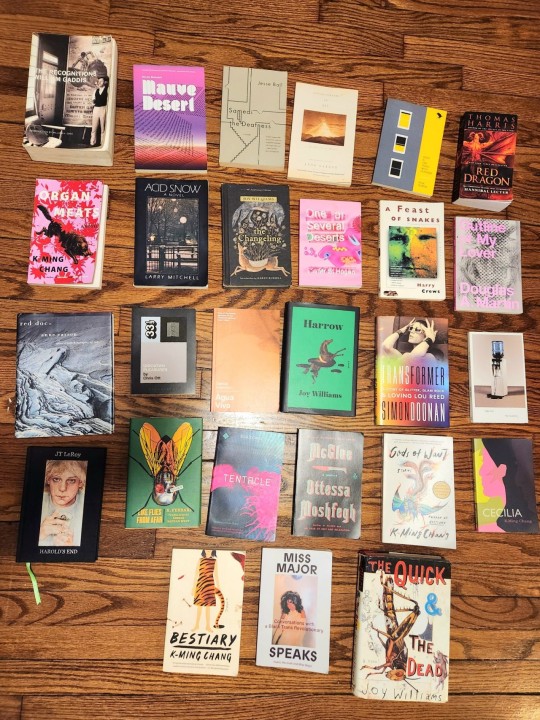
I'll do superlatives at the end, here is the list of what I read this year, in chronological order. (Apologies for the random line breaks in the middle of the list, tumblr doesn't like it when you have 50+ lines without breaks)
-The Sorrows Of Young Werther by Johann von Goethe -The Changeling by Joy Williams -Child of God by Cormac McCarthy -Pierrot Mon Ami by Raymond Queneau -The Ghost Network by Kate Disabato -The Thirty-Nine Steps by John Buchan -Richard III by William Shakespeare (reread) -The Recognitions by William Gaddis -A Kestrel For A Knave by Barry Hines -Grief Is The Thing With Feathers by Max Porter -Bluets by Maggie Nelson -The Wild Party by Joseph Moncure March -The Hospital by Ahmed Bouanani -I Love Dick by Chris Kraus -Minor Detail by Adiana Shibli -Autobiography of Red by Anne Carson -Rent Boy by Gary Indiana -One Or Several Deserts by Carter St Hogan -Samedi the Deafness by Jesse Ball -Norma Jean Baker of Troy by Anne Carson -Die My Love by Ariana Harwicz -Missing Person by Patrick Modiano -Petite Fleur by Iosi Havilio -Freshwater by Akwaeke Emezi -The Address Book by Sophie Calle -In The Dream House by Carmen Maria Machado -Plastic Jesus by Poppy Z Brite -New Animal by Ella Baxter -The Effect of Gamma Rays on Man-In-The-Moon Marigolds by Paul Zindel (play) -Green Girl by Kate Zambrino -Death In Spring by Merce Rodoreda -Harold's End by JT LeRoy (reread) -Kitchen by Banana Yoshimoto -Stranger To The Moon by Evelio Rosero -H of H Playbook by Anne Carson -When The Sick Rule The World by Dodie Bellamy -Wittgenstein's Mistress by David Markson -Agua Viva by Clarice Lispector -Not One Day by Anne Garreta -Mauve Desert by Nicole Brossard -Binary Star by Sarah Gerard -Slug and other stories by Megan Milks -Weetzie Bat by Francesca Lia Block (reread) -The Deer by Dashiel Carrera -Mean by Myriam Gurba -Humiliation by Wayne Koestenbaum -The Toaster Project: Or A Heroic Attempt to Build a Simple Electric Appliance from Scratch by Thomas Thwaites -Kind Mirrors, Ugly Ghosts by Claire Donato -Our Wives Under The Sea by Julia Armfield
-Notes on Thoughts and Vision & The Wise Sappho by H.D. -Harrow by Joy Williams -A Feast Of Snakes by Harry Crews -Low Life: Lures and Snares of Old New York by Lucy Sante -Milkshake by Travis Dahlke -Little Fish by Casey Plett -Hurricane Season by Fernanda Melchor -Sex Goblin by Lauren Cook -Biography of X by Catherine Lacey -Why Fish Don't Exist: A Story of Loss, Love, and the Hidden Order of Life by Lulu Miller -Hir by Taylor Mac (play) -Daddy Boy by Emerson Whitney -Notes On Camp by Susan Sontag -Transformer: A Story of Glitter, Glam Rock, and Loving Lou Reed by Simon Doonan -Johnny Got His Gun by Dalton Trumbo -Acid Snow by Larry Mitchell (reread) -33 1/3 Joy Division - Unknown Pleasures by Chris Ott -The Silent Patient by Alex Michaelides -red doc> by Anne Carson -Darryl by Jackie Ess -A Visit From The Goon Squad by Jennifer Egan -The Postman Always Rings Twice by James Cain -Body by Harry Crews -St Sebastian's Abyss by Mark Haber -The Quick & The Dead by Joy Williams (reread) -Don't Think Twice: Adventure and Healing at 100 Miles Per Hour by Barbara Schoichet -Annihilation by Jeff Vandermeer -Timbuktu by Paul Auster -Nevada by Imogen Binnie -The End We Start From by Megan Hunte -Organ Meats by K-Ming Chang -Like Flies From Afar by K. Ferraro -Say Nothing: A True Story of Murder and Memory in Northern Ireland by Patrick Radden Keefe -Bestiary by K-Ming Chang -Playboy by Constance Debre -Red Dragon by Thomas Harris -Parting Gifts for Losing Contestants by Jessica Mooney -The Outline of My Lover by Douglas A Martin -Monstrilio by Gerardo Samano Cordova -Essex County by Jeff Lemire (reread) -Tacky: Love Letters to the Worst Culture We Have To Offer by Rax King -The Death of Francis Bacon by Max Porter -Lover Man by Alston Anderson -Cecilia by K-Ming Chang -The Employees by Olga Ravn -It Lasts Forever And Then It's Over by Anne De Marcken -Mercy Killing by Alandra Hileman (play) -Tentacle by Rita Indiana
-Nox by Anne Carson -What I Talk About When I Talk About Running by Haruki Murakami -McGlue by Ottessa Moshfegh (reread) -Fever Dream by Samanta Schweblin -John by Annie Baker (play) -Widow Basquiat by Jennifer Clement -All Down Darkness Wide by Sean Hewitt -The Blue Books by Nicole Brossard -The Book Of Difficult Fruit: Arguments for the Tart, Tender and Unruly by Kate Lebo -Blood Of The Dawn by Claudia Salazar Jimenez -The Balloonists by Eula Biss -Ravage: An Astonishment Of Fire by MacGillivray/Kirsten Norrie -Gods Of Want: Stories by K-Ming Chang -Fem by Magda Carneci -Miss Major Speaks: Conversations with a Black Trans Revolutionary by Miss Major Griffin-Gracy and Toshio Merino -Mr Parker by Michael McKeever (play) -Fucking A by Suzan-Lori Parks (play) -Dictee by Theresa Hak Kyung Cha -Otherspace, a Martian Ty/opography by Brad Freeman and Johanna Drucker
I DNF'ed a few books, but all were put down with the intention of finishing them at some point. Mostly they were books I needed to read when I was less busy/in a different headspace. I DNF'ed: Soldiers Don't Go Mad: A true story of friendship, poetry and mental illness during the first world war by Charles Glass, a reread of Her by HD, and The Apple In The Dark by Clarice Lispector. The Lispector and HD are both modernist novels that need 100% attention, and the Glass book is a nonfiction book (very good so far) that I put down in favor of something that at the time was more interesting.
I gave out a lot of 5 stars this year. The books I rated as 5 stars were: The Changeling by Joy Williams, The Recognitions by William Gaddis, Our Wives Under The Sea by Julia Armfield, 33 1/3 Unknown Pleasures by Chris Ott, Transformer by Simon Doonan, Johnny Got His Gun by Dalton Trumbo, Body by Harry Crews, Organ Meats by K-Ming Chang, Say Nothing by Patrick Radden Keefe, and Fever Dream by Samanta Schweblin.
~Superlatives~
Like last year, I'm going to do runners-up because I read so many books.
Favorite book: The Recognitions by William Gaddis. I have to pick this one as my favorite for the year, because reading it was a journey, and because it was a book that was exactly everything I love in a book: fascinating, very human characters, weird formatting, great dialogue, metaphors galore, and most importantly, hundreds of cultural, artistic, historical, biblical and literary references. I started this book on January 4 and I finished it February 22. It was so unbelievably dense, probably the densest novel I've ever read, and I absolutely loved it. So much is going on in this novel that it's hard for me to summarize. In the very shortest version of a summary, it is a novel about counterfeits (specifically paintings, but counterfeits in all and any forms) and Catholicism in 1930s/40s New York. The main character is a young man named Wyatt Gwyon, a talented artist who instead of painting for himself, becomes a skilled counterfeiter-- not because he wants to make money, but because he's obsessed with the perfection of making exact interpretations of other people's art. He also struggles with religion and belief due to his strange religious upbringing. Many, many other characters are also focal points throughout the novel. The book is unique in that it doesn't use quotation marks when characters speak and rarely uses "he said"/"she said" or any similar phrase. But Gaddis is incredibly talented at writing dialogue so that each character's voice comes through, and it's obvious (except when he doesn't want it to be) who is speaking. Gaddis is also wonderfully scathing, and much of the novel is incredibly witty and intelligent observations about the Modernist art world and artistic spaces in general. The characters are all fascinating, there is a lot of mirroring and metaphors. I say this book is about counterfeits in every form, because it constantly highlights different ways in which each character is faking something, or lying, or pretending to be/know/do/think something they are not. This book was incredible, I annotated every single page and had so much fun reading it, even though or perhaps because it was so unbelievably dense.
Just for a bit of reference, here are a few of the more annotated pages in my copy of The Recognitions:
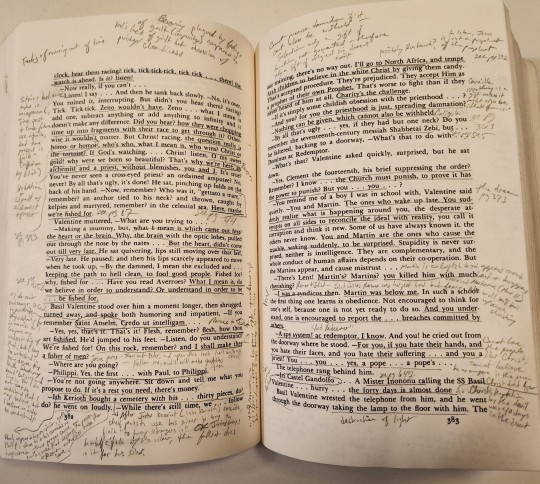


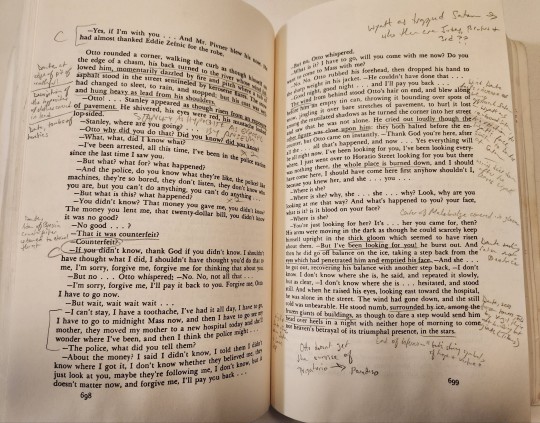
Runner up: Body by Harry Crews (more on this one further down)
Least favorite book: Freshwater by Akwaeke Emezi. I was so disappointed by this book. The blurb on the back made it sound like it was going to be really beautiful and interesting and unique. It wasn't. It was all tell and no show. It follows Ada, a person who is born with one foot in the spirit world. A traumatic experience at university causes her to develop split personalities as the spirits from the other side step forward to protect her from trauma. Unfortunately, the spirits who now control her body have darker, more dangerous desires. Sadly, there was almost no plot, just description after description of Ada's unhealthy relationships and erratic behavior. But because the narrative is so distanced from said relationships and from Ada, the high stakes of this behavior is not felt, not really. Interesting characters can easily save 'all tell and no show type' books, but none of the characters get delved into with any depth, even Ada. The show rather than tell narrative also seriously undermines the poetic prose that crops up almost at random. This book felt flat. No plot, little stakes felt, no interesting characters, tell rather than showing everything, and it's not compelling at all.
Runner up: Playboy by Constance Debre. The back of this book describes it as a memoir detailing the writer's "decision, at age forty-three, to abandon her marriage, her legal career, and her bourgeois Parisian life to become a lesbian and a writer." Which sounds amazing! But it isn't! It's unbelievably pretentious and quite boring. It's mostly just complaining hidden by a facade of faux-philosophical meandering and directionless autobiographical vignettes. The author is a lawyer and she spends most of the time complaining about poor people and about women. It's so hilariously misogynistic. It's just various vignettes of her relationships with various women (who she dislikes and disparages for being femme or having bad bodies or for having lowbrow/uncultured interests etc etc) and then her going and visiting her ex-husband and teenage son, and then complaining that she has nothing. There's little to no emotion in the book, she is not charming, and her pseudo-philosophical musings are boring.
Most surprising/unexpected book: Body by Harry Crews. This book crept up on me in terms of a favorite. Crews' writing is not for everyone, but it's absolutely for me. The book follows bodybuilder Shereel Dupont and her trainer, Russell, who are at the world bodybuilding competition. Shereel has left home to compete over the past year and is now one of the most likely to win. Unfortunately, her family, who are "corpulent rednecks" with odd habits, show up to cheer her on, causing disruption and chaos throughout the hotel at which the competition is held and turmoil for Shereel herself. This book blew me away completely. Every time I thought it had reached a plateau of weirdness and chaos and insanity, it ratcheted that all up even higher, culminating in the most perfectly fucked up ending.
Runner up: Fever Dream by Samanta Schweblin. A mother trapped in the liminal space between life and death is made by an unfamiliar changeling child to retell the events of the recent past, desperately trying to pinpoint the moment she can reverse the environmental poisoning of herself and her daughter. I picked this book up because it sounded interesting, and then it ended up being an amazingly written short horror novel. It had a lot of interesting thoughts on motherhood and the horror of being a parent - not in a negative way, but the horror of wanting to protect and keep your child safe and the inability to do so.
Most fun book: Like Flies From Afar by K Ferrari. I fully judged a book by its cover with this one, and it did not disappoint. Small-time criminal/oligarch Mr Machi thinks he's hot shit, until he pops a tire on the way to an appointment and discovers an unidentifiable corpse in his trunk. As he scrambles to deal with the body, his paranoia grows as he tries to calculate who out of all his enemies and employees might be responsible, and who is trying to frame him, and who the body might be, and his life slowly transforms into a nightmare. Everyone in this book is loathsome, but in a way that is so fun to hate. The whole novel is a romp of panic and paranoia, people who think they're so cool and hard exposing how uncool they are, and a mystery that's so fun because watching the protagonist panic is a kind of schadenfreude.
Runner up: Transformer by Simon Doonan. This is a book for people who love Lou Reed, by a man who loves Lou Reed. It's just a wonderfully written biography that focuses mainly on the album Transformer, but also gives Lou Reed's history and is interspersed with stories about Doonan's own thoughts and experiences with Reed. The whole book is really passionate and vivid, and fun to read even if you don't have the album immediately to hand.
Best queer book: Our Wives Under The Sea by Julia Armfield. Leah, a marine biologist, has returned from a deep-sea voyage that went wrong. Her wife Miri begins to realize that something is wrong, and Leah came back changed. The narrative switches between Miri's point of view as she tries to reach Leah and struggles help her despite not knowing what's happening to her wife, and Leah's point of view as she remembers and recounts what happened to her during her submarine voyage. I started this book at work and brought it home. In the middle of reading it, I stopped to finish some task (I think it might have been to make dinner), and ended up having to cut the task short because I needed so badly to keep reading. The most compelling part of the book is the very different ways the two characters' love for each other shines through, even in the darkest moments of the novel.
Runner up: Darryl by Jackie Ess. The titular narrator of this novel discovers that he genuinely enjoys a cuckolding lifestyle, watching men have sex with his wife. But then he realizes that part of the reason he likes it so much, is that maybe he wants to be the wife. His explorations with sex and gender and relationships (and basketball) begin to unravel his marriage and his friendships and his own mind. Then he learns more about one of the men his wife has been sleeping with, and things get dangerous. I loved this book because despite it being written by a trans woman, the story doesn't at all go where you'd expect regarding gender or sexuality. It's satirical, it's witty, it's got some cool things to say about kink and about gender, and it's totally original.
Saddest book: Johnny Got His Gun by Dalton Trumbo. This is a classic I'd been meaning to read for a long time. The narrator is an American WWI soldier named Joe who was hit by an artillery shell and has woken in the hospital having had his arms and legs amputated, as well as most of his facial features mutilated beyond use/recognition. Trapped in his body, he drifts through memories and musings on life and war and philosophy as he tries to keep track of the days and to figure out some way to communicate with the hospital staff. It's no wonder this book is a classic. The writing is incredible, the imagery vivid and the plot totally gripping, even as it switches between the peaceful past and the horrible present. The end is completely gut-wrenching.
Runner up: Minor Detail by Adania Shibli. This novel explores what in history is a minor detail, and what impact that little moment might have on someone in the future. The first part of the novel opens in Palestine in 1949, in a military camp, where a group of Israeli soldiers (led by a captain suffering from a bite-induced hallucinogenic fever) kidnap, rape, and murder an unnamed Palestinian woman and bury her body in the desert. Fifty-odd years later, a Palestinian writer learns about this "small" moment in history, which occurred 25 years to the day before her birth, and becomes obsessed with learning more. She obtains an illegal pass to the Zone in which the woman died, determined to go there and find more information. I don't want to summarize much more because I don't want to give away any of the hard-hitting plot points. But Minor Detail was published in 2020, and it explores the cycles of violence and the ways in which oppression has not changed for the Palestinian people. It's a book that I wish I had read twice because (as the title suggests) there were a lot of small details that repeated themselves or were less noticeable at first but slowly grew or became important later in the story, and I'm sure I would have noticed more.
Weirdest book: The Changeling by Joy Williams. I love Joy Williams! I love everything she writes! Her themes are always so interesting and her writing style is so unique. The main character, a young woman named Pearl, escapes her terrible marriage by joining a rich older man and in doing so ends up living with him on an island that is populated by children he has taken under his wing. Pearl wants little to do with them and spends most of her days getting drunk by the pool -- the children are eerily smart and her son has joined their games and lessons, and they all want her attention. But her son is less and less her son as time goes on, and the children are not always the children, and the adults in the house are all bizarre and half-mad. I wish I could give a better summary, but Joy Williams books are always difficult to summarize, because so much of the stories are less about the plot and more about the characters just feeling things at the reader, and the plot is often built on or around odd occurrences and philosophical musings. This book blew me away with its imagery and its metaphors. I want to reread it, because it was just so amazing. My absolutely favorite thing about Joy Williams (and this is true for all of her books) is the way she writes these incredibly profound and philosophical phrases like they're nothing at all, like they're so easy, just breezes on by them even though she's just punched you in the chest. It's amazing.
Runner up: Fever Dream by Samanta Schweblin.
Most gripping book: Say Nothing: A True Story of Murder and Memory in Northern Ireland by Patrick Radden Keefe. This book is an absolute masterclass in pacing. It tells just a few fragments out of the whole history of the Irish Troubles, but the fragments that are focused on are woven together with brilliant timing, humanizing and vivid portrayals, fantastic analysis and contextualization, and altogether excellent writing. Every time I put this book down I wanted to keep reading, to know what was going to happen next. The book has 3 focal points: Gerry Adams, (alleged) leader of the IRA; Dolors Price, a member of the IRA; and the family of Jean McConville, a woman kidnapped by the IRA. At first, all three storylines are disparate, but Keefe slowly weaves them together, pulling all the threads of context and action and years in prison or government or delinquent schools together slowly but steadily. The book reads like a thriller, and I adored it completely. (Yes, I do know about the miniseries. I haven't finished watching it yet!)
Runner up: Our Wives Under The Sea by Julia Armfield.
Book that taught me the most: Say Nothing by Patrick Radden Keefe
Runner up: The Toaster Project: Or A Heroic Attempt to Build a Simple Electric Appliance from Scratch by Thomas Thwaites. This could also go under weirdest book, easily. As a graduate art school project, Thwaites decided to attempt to build the simplest (and cheapest) appliance he could think of - a toaster - fully from scratch. Quite literally, starting with mining the elements to make the right kinds of metal and figuring out how to make the right kind of plastic. Half of the book is Thwaites' attempts to build various elements of a toaster - and how they go wrong, or right, and why it's so hard. The other half discusses all the processes that go in to making all these elements in a more manufactured setting, their impact on the environment and the economy, and the difference between cheap mass-produced products that break down vs more expensive products that last longer. The writing was fun and included photos and diagrams and interviews with various industry professionals Thwaites contacted to learn more.
Most interesting/thought provoking book: The Recognitions by William Gaddis
Runner up: Organ Meats by K-Ming Chang. I've now read everything this author has published and this is by far her best book. Her narrative style is so unique and so poetic, and the themes she always comes back to are so interesting, and they culminate in this amazing novel. This magical realist novel centers around two best friends, Anita and Rainie, who are both first generation Taiwanese-American. The story opens when they are adolescents, and Anita has recently learned that they come from generations of dog-headed women and women-headed dogs. They vow to become dogs together, tying a string around each other's throats as collars and playing at dogs in the empty lot near their apartment complex. But Anita's dreamlike imagination and obsessively loyal personality starts to clash with Rainie's more reserved nature, and when it becomes too much, Rainie's family moves away. Rainie grows up, while unbeknownst to her, Anita has sunk into a dreamworld and her body has begun to rot. She narrates her family's past and her mother's bloodline because she cannot narrate her own present. When she returns to the town she grew up in, Rainie discovers Anita's condition, and knows that she is the only one who can save her. This novel is beautiful, incredibly poetic, and experiments with formatting and narration in really unique ways. Its exploration of friendship and queerness and obsession and tradition and folklore is absolutely fascinating. I often write in my books and underline sentences or paragraphs that I really love. I didn't write in this one, because I would have ended up underlining the entire novel.
Longest/shortest book: My longest book was The Recognitions by William Gaddis at 952 pages, and my shortest was Notes On Camp by Susan Sontag at 57 pages.
General thoughts on all the other books that didn't get superlatives:
-Child of God by Cormac McCarthy. This is the first McCarthy book I've ever read (I know, I know) and I really enjoyed it. You just watch a horrible guy walk around in the rural countryside of a small town, doing increasingly fucked up things and committing various awful crimes. Which is exactly up my alley in terms of literature. The main character, Ballard, is someone who is so weird and pathetic that he becomes turned inside out into evilness. You feel sorry for him but you also hate him and he's also fascinating because he's so fucking weird. It's a great book.
-The Ghost Network by Catie Disabato. This book was so much fun to read while living in Chicago. It's a rock n roll mystery novel that riffs on Situationism and the L tracks and maps. A rock star disappears, and the main character who is a fan of her's is determined to find out what happened to her. What she uncovers is a series of clues based on defunct lines and stations of the Chicago transit system, and the Situationist concept of detournment, which lead her towards finding out what actually happened to the rock star. This book was so much fun, and so much of it was based on real life defunct train lines and the actual Situationists, both of which I found really interesting. The ending was also just so good! Somehow I managed to have read everything I needed to in order to get every single reference in the book, which was really surprising to me, because they all came from different places.
-New Animal by Ella Baxter. This book baffled me. It is about a woman who works as a makeup-artist at her family's morgue. When her mother dies unexpectedly, she skips the funeral and goes to stay at her estranged father's house. While there, trying to figure out how to vent her grief, she decides to try out the local kink scene. Her first experience is with a dom who is a manipulative, horrible asshole. She has a bad time, but wants to try again, so she goes to a place that hosts scenes. She acts like she knows what she's doing when she doesn't, no one gives her any instruction, so she fucks up massively, and everyone has a bad time. It's the worst portrayal of the kink scene I think I've ever encountered. The author said she did a lot of research but it just seems like a lot of terrible assumptions and misinterpretations. I thought it was going to be a book that positively portrayed kink and people who like the kink scene, but it's very much not. It didn't even feel like the author was doing this so the character would learn that she can't run from her grief. It seemed more like the author had one bad experience due to poor communication or shitty individuals, and then decided that's what the whole scene was like.
-Harold's End by JT LeRoy. I read this book in high school (or perhaps just after graduating) and totally fell in love with it, and then never saw another copy until recently. It was so good to reread it, to re-experience the gorgeous watercolor portraits that come with it. The novel follows a young street kid/hustler who lives with other street kids; all his friends have pets but he doesn't. A john takes a liking to him and buys him a snail as a pet, who he names Harold. The book follows him as he lives on the streets and as his relationship with the john develops. The book is classic JT LeRoy, and the end is LeRoy's usual style of characters experiencing a life lesson and growth but not necessarily in a happy way. It definitely holds up!
-Wittgenstein's Mistress by David Markson. This was such a fun and weird book and I really enjoyed it. Markson's idea for the novel was "what if someone actually lived the way that Wittgenstein's Tractatus suggests?". What we get is a woman who believes she is the last person on earth (it is never confirmed whether this is true or not). She muses on life, culture, art, philosophy, and her past, and discusses her trips across the world despite its emptiness. But her story changes constantly; she's always referencing things she said before and editing herself. It's a weird, fun, fascinating novel with a lovably weird main character.
-A Feast Of Snakes by Harry Crews. Yet another fucked up book that I loved. It follows Joe Lon Mackey, a former high school football star that now lives a dead-end life in his hometown in Georgia. Each year the town hosts the Rattlesnake Roundup, where people come from many states away to try and catch as many rattlesnakes as they can in order to win a competition. Joe Lon is in charge of the event now that his father is too old and ill. He's uncomfortably self-aware of his own personal failings and his inadequacy and his abusive relationship with his wife; he'd rather not think about any of it and is incapable of figuring out how to change things. But his old girlfriend is returning for the event, and his father's attempts to control the goings-on from afar mean he's unable to stop thinking about where his life has ended up and where it's going. All this drives him slowly crazy with desperation until the insane ending. Crews is incredibly talented at writing characters that are likeable despite being so flawed and fairly awful people. This book is no exception.
-Milkshake by Travis Dahlke. What a weird novel! In a near-future dystopian heatwave, an 11 year old girl escapes the environmental catastrophe by traveling back in time to her past life as a fertilizer salesman whose marriage is slowly collapsing. I really enjoyed it, because it was just so odd. Now that I'm thinking about it, I feel as though it would have been really interesting to read just before or just after reading Tentacle; both books focus specifically on time travel and on environmental disaster.
-Hurricane Season by Fernanda Melchor. At the opening of the box, a Witch has been murdered in a small village in Mexico called La Matosa. The rest of the chapters are narrated by different characters, who all have some small or large hand in the death of the Witch, who was a woman who the whole town visited in secret for medicine, fortune-tellings, and advice. The narrating characters include a schoolgirl, a drug dealer, a prostitute, a hapless husband who wants to make something of himself, and a teenager in love with his young girlfriend. With each narration we learn more about the Witch, and her mother who was a Witch before her. Slowly, we get inklings of the nature of the murder, and the revelation at the end is brutal. Melchor's writing is incredibly vivid, and the characters are all caught in the cycle of poverty, driven by superstition and fear and hardship. None of the characters are likeable, but they're all so human.
-Biography Of X by Catherine Lacey. In a dystopic alternate-universe US, where the Southern Territory split from the North after WWII and established a fascist theocracy, a woman named CM grieves her recently deceased wife X, who was a famous artist. Despite X's wishes, CM decides to delve into her wife's past, researching her history before they met and before she was known as X. She uses her credentials and privileges as a journalist to cross into the Southern Territory and learn about X's family and the communities from which she came, her activism and her hidden lives, and begins to realize that maybe learning all this about the woman she loved won't benefit her in the long run and that maybe their relationship wasn't as rosy as she thought. This novel combined fiction and real life in really fascinating ways, and includes both real and fake sources in its footnotes.
-The Silent Patient by Alex Michaelides. A famous and successful painter murders her husband and then refuses to speak. A psychologist who is also a fan of her work is determined to get her to speak again. Obsessed with uncovering the truth, he ends up taking risks that threaten himself and his patient. A fun mystery that went down easy. It didn't attempt to be too realistic from the start, so suspension of disbelief wasn't hard. I do think the book could have done without the entire last part. Leaving it on the realization of what had happened and allowing the reader to sit with that realization (especially with how creatively the twist is presented) would have had more impact I think than the slower and less engaging denouement of the last 3 chapters, which were far weaker than the rest of the book.
-Acid Snow by Larry Mitchell. I reread this book for the first time since about 2009 and really enjoyed it. It's a very sad novel about a man living in NYC during the height of the AIDS epidemic. Most of his friends and lovers have died and he's scared and sad about his own life and cynical about love, but he's attracted to the man who owns the shop below his apartment. It's a dark book, sad and scared and jaded. I think the main character's anxiety and grief that slowly escalates into paranoia is an amazingly surreal way to portray all the emotions that consumed the queer community at that time. I also loved the sort of lack of closure at the end - because many people didn't get that.
-Annihilation by Jeff Vandermeer. I don't generally go for science fiction novels, but I read this one because so many people said they had liked it. I really enjoyed it. The unnamed narrator, a biologist, is part of an all-female expedition into a harsh, unknown territory that has appeared adjacent to the US. The suspense and strangeness of the novel had excellent pacing. The descriptions were also so vivid and clear, which made the story's weirdness so compelling. I loved watching the main character struggle to remain objective the whole time while knowing that she's failing. Her growing fascination and terror is so fun to read as each feeling tries to overtake the other. I also think it was great as a standalone and I feel no interest in reading the other books in the same universe.
-Nevada by Imogen Binnie. I'm a bad queer person, I hated this book. In it, the narrator, a trans woman, is frustrated with her life and has just broken up with her girlfriend, so she steals her ex's car and drives away, ending up in a small town where she spends the night with a department store employee. I just really don't like books that are meandering tell and no show without characters or a plot that are interesting. This entire book felt like someone recounting their weekend over breakfast, complete with casual informal language and overuse of the word "like". Which would be fine if any of the characters were compelling, or if the plot was really interesting and went somewhere, but it didn't. A good portion of it is just musings on New York City, but without the creativity or vividness that other portrayals of NYC have to offer. After I read it, I learned this book was kind of the catalyst for a specific style of trans writing. Which also explains why I hated Detransition, Baby when I read it a couple years ago, as it's a sort of literary descendant of this. I'm happy to read books that are tell rather than show....so long as something interesting happens or at least one of the characters is unique and compelling. This book sadly has neither.
-Essex County by Jeff Lemire. I read this for an English class in university, so this was a reread and I really enjoyed reading it a second time! All the stories in this collection are so beautiful and compelling, all the characters are so real. And the art style is fantastic. The stories revolve around characters living in the titular Essex County in Canada, across a number of generations. It weaves together their relationships and their lives, much of which revolves around hockey. There were some storylines I remembered quite well and others I didn't remember at all, so it was really nice to revisit this one.
-Ravage: An Astonishment of Fire by MacGillivray. Man, this book had so much potential. This novel is a fake biography of a fake poet who disappeared from a Scottish island in the 1960s after falling into delusions that he has become a demon. The fascinating thing about this book (at first), is that it's completely convinced that it is an actual nonfiction book. It gives no hints that it's fake, and the first 50 pages are convincingly written with an academic, nonfiction voice as the novel is utterly convinced of its own delusion of factualness. The novel claims to be an analysis of found papers: first, the poetry and written tracts of Tristjan Norge, a Norwegian poet, then the analysis of his works by MacGillivray, and finally, the diary of his companion Luce Montcrieff. Unfortunately, it is fairly repetitive in a way that bogs the reader down quite a bit. Even so, I think I would have enjoyed much, much more if the ending did not abruptly switch genres to a supernatural/fantasy novel in a way that was startling and had no previous indications of earlier in the book. Up to the last 20 pages I thought it was interesting, even when it was dense, but the end felt like the author didn't know how to end the novel and just used the deus ex machina of supernatural occurrences.
My goal for 2025 is to read majority nonfiction. I don't know if I'm going to actually meet that goal, but I'll try. I don't have any goals for how many books I want to read, especially because I tend to read nonfiction quite a bit slower than fiction, so I don't have a good idea of what my reading amount goal should actually be. This year I also forgot entirely about my attempt to read all of Jean Genet's (translated) works, so I will hopefully actually meet that goal in 2025, since I only have one or two books left to read. But my first three books of the year are going to be Soldiers Don't Go Mad by Charles Glass, which I started this year but didn't finish, The Declared Enemy: Texts and Interviews by Jean Genet, and Rogues: True Stories of Grifters, Killers, Rebels and Crooks by Patrick Radden Keefe.
#reading list#reading list year in review#book list#book list year in review#book recommendations#reading#books
12 notes
·
View notes